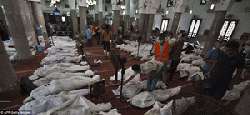NEY YORK – Supporters of Egypt’s Muslim Brotherhood stormed and torched a government building in Cairo on Thursday, Aug. 15, while families tried to identify hundreds of mutilated bodies piled in a Cairo mosque a day after they were shot dead by the security forces.
Egypt’s health ministry says 623 people were killed and thousands wounded in the worst day of civil violence in the modern history of the most populous Arab state.
Brotherhood supporters say the death toll is far higher, with hundreds of bodies as yet uncounted by the authorities, whose troops and police crushed protests seeking the return of deposed President Mohamed Morsi.
State television quoted the Interior Ministry as saying the security forces would again use live ammunition to counter any attacks against themselves or public buildings.
The U.N. Security Council urged all parties in Egypt on Aug. 15 to end the violence and exercise maximum restraint.
“The view of council members is that it is important to end violence in Egypt and that the parties exercise maximum restraint,” Argentine U.N. Ambassador Maria Cristina Perceval told reporters after the 15-member council met on the situation.
The Security Council was briefed on the situation in Egypt behind closed doors by U.N. Deputy Secretary-General Jan Eliasson. The meeting was jointly requested by council members France, Britain and Australia.
“The members first of all expressed their sympathy to the victims and regretted the loss of lives,” said Perceval, who is council president for August. “There was a common desire on the need to stop violence and to advance national reconciliation.”
Turkish Prime Minister Tayyip Erdogan had earlier also called for the U.N. Security Council to convene quickly after what he described as a massacre in Egypt and rounded on Western nations for failing to stop the bloodshed.
International condemnation had rained down on Cairo’s military-backed rulers for ordering the storming of pro-Morsi protest camps after dawn on Aug. 14, six weeks after the army overthrew the country’s first freely elected leader.

|
| Dead bodies lined up at Al-Imam Mosque in Cairo. |
The U.S. State Department said it would review aid to Egypt “in all forms” after President Barack Obama cancelled plans for upcoming military exercises with the Egyptian army, which Washington funds with $1.3 billion in annual aid.
“The United States strongly condemns the steps that have been taken by Egypt’s interim government and security forces,” Obama said.
“We deplore violence against civilians. We support universal rights essential to human dignity, including the right to peaceful protest.”
His Defense Secretary Chuck Hagel warned Egypt’s army chief that “the violence and inadequate steps towards reconciliation are putting important elements of our longstanding defense cooperation at risk.”
Western diplomats have told Reuters that senior U.S. and European officials had been in contact with Egypt’s rulers until the final hour, pleading with them not to order a military crackdown on the protest camps, where thousands of Morsi’s followers had been camped out since before he was toppled.
There were reports of protests on Aug. 15, but no repeat of the previous day’s bloodbath. In Alexandria, Egypt’s second largest city, hundreds marched, chanting: “We will come back again for the sake of our martyrs!”
Brotherhood spokesman Gehad El-Haddad said anger within the 85-year-old Islamist movement, which has millions of supporters across Egypt, was “beyond control.”
“After the blows and arrests and killings that we are facing, emotions are too high to be guided by anyone,” he said.
The Brotherhood has called on followers to march in Cairo later on Aug. 15, while funeral processions for those who died could provide further flashpoints in the coming days.
In Cairo, Reuters counted 228 bodies, most of them wrapped in white shrouds, arranged in rows on the floor of the Al-Imam Mosque in northeast Cairo, close to the worst of the violence.
The mosque had been converted into a morgue, resembling the aftermath of a World War One battlefield. Medics pushed burning incense sticks into blocks of ice covering the bodies and sprayed air freshener to cover up the stench.
The authorities and their allies, which control nearly all media inside Egypt, insist those inside the pro-Morsi camps were heavily armed, although international journalists have seen only limited evidence of weapons beyond sticks and rocks.
Churches around the country were attacked and many torched on Wednesday, Aug. 14, hightened fear of an Islamist backlash among the Christian minority, 10 percent of the population of 85 million.
Back on the streets of Cairo, some spoke of their despair.
“Yesterday I cried. I think we’re the furthest we’ve ever been from true reform or justice,” said Sara, who declined to give her last name, describing herself as a secular activist.
“I don’t believe that this is going to end in one month. I think is the beginning of another 30 years of military rule.”






Leave a Reply